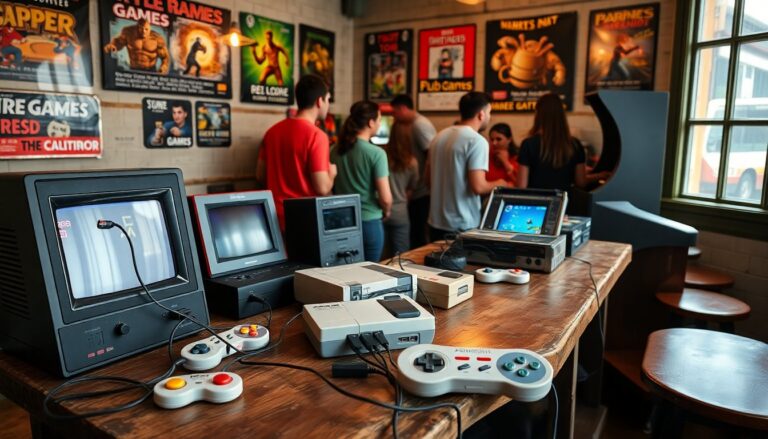Argomenti trattati
The resurgence of retro gaming consoles
The world of gaming is ever-evolving. However, there is a notable resurgence of interest in retro gaming consoles. This revival is not a fleeting trend; it represents a nostalgic journey for many gamers, both seasoned and newcomers. The appeal of these vintage systems, coupled with modern adaptations, provides a unique experience that links players to the past while integrating contemporary technology.
The allure of nostalgia in gaming
Nostalgia significantly influences the resurgence of retro gaming consoles. Players who grew up in the 1980s and 1990s cherish memories of iconic systems like the Nintendo Entertainment System (NES) and the Sega Genesis. These consoles not only defined a generation but also introduced beloved characters and classic titles that still resonate today.
As technology evolves, so does the opportunity to experience these classic games on contemporary platforms. Companies have seized this nostalgia by launching mini versions of classic consoles, such as the NES Classic Edition, which comes pre-loaded with popular games. These devices appeal not only to long-time fans but also to a new audience eager to explore the origins of gaming.
Modern adaptations of classic consoles
The retro gaming revival extends beyond physical consoles. Digital platforms like Steam and GOG have democratized access to classic games through emulation and digital downloads. This shift enables younger generations to discover the charm of games that laid the foundation for the industry. The fusion of old-school graphics with contemporary gameplay mechanics produces an engaging experience that resonates with both nostalgic players and new fans.
Moreover, the emergence of indie game developers has further enriched the retro gaming landscape. Many indie titles draw inspiration from classic games, employing pixel art and straightforward mechanics reminiscent of gaming’s early days. This approach not only evokes nostalgia but also encourages innovation within the genre.
The cultural significance of retro gaming
Retro gaming consoles extend beyond mere entertainment; they embody a cultural legacy. These devices hark back to an era when gaming prioritized simplicity and creativity over high-definition graphics and intricate narratives. Retro games focus on gameplay mechanics, fostering a distinct style of engagement that contrasts sharply with modern gaming.
This appreciation for retro gaming has given rise to a vibrant, community-driven movement. Enthusiasts congregate at conventions, participate in online forums, and engage in discussions on social media about their favorite games and consoles. This sense of community transcends mere gameplay; it includes sharing personal stories, restoring vintage hardware, and creating fan art that celebrates the nostalgia of these classic games.
The impact of technology on retro gaming
Technology has significantly transformed the way we engage with retro games. The rise of emulators enables players to enjoy classic titles on contemporary devices, often featuring enhanced functionalities such as save states and graphical filters. This increased accessibility allows games that were once limited to obsolete hardware to reach a broader audience.
Moreover, companies are investigating the potential of virtual reality (VR) and augmented reality (AR) to enrich the retro gaming experience. Picture yourself entering the pixelated realm of Super Mario Bros. or racing through OutRun in a fully immersive setting. Although much of this technology is still developing, the opportunities for retro gaming are vast.
The future of retro gaming: a nostalgic revival
The future of retro gaming consoles appears promising, driven by a blend of nostalgia, technological innovation, and community involvement. As younger generations uncover the charm of classic games, the appetite for retro consoles and titles continues to rise. It is expected that companies will persist in creating miniature versions of iconic systems, while digital platforms will ensure that classic games remain accessible for years to come.
Moreover, the convergence of retro gaming with modern technology signals potential advancements. As the gaming landscape evolves, we may witness an even greater incorporation of retro elements into contemporary titles, forging a connection between the past and the present.
Diciamoci la verità: the resurgence of retro gaming consoles is more than just a nostalgic trend. It signifies a deeper appreciation for the cultural impact these systems have had on the gaming landscape. As we advance into the future of gaming, it is crucial to acknowledge and celebrate the legacy that has shaped our experiences. The exploration of retro gaming not only connects generations but also fosters community. It reignites the creative spark that continues to define the gaming industry.

